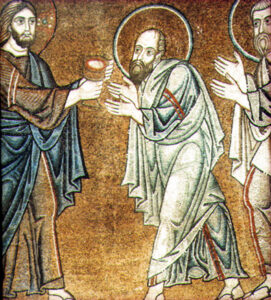From a sermon by Saint Peter Chrysologus, bishop
| The sacrament of Christ's incarnation |
|---|
 |
|---|
A
virgin conceived, bore a son, and yet remained a virgin. This is no
common occurrence, but a sign; no reason here, but God’s power, for he
is the cause, and not nature. It is a special event, not shared by
others; it is divine, not human. Christ’s birth was not necessity, but
an expression of omnipotence, a sacrament of piety for the redemption of
men. He who made man without generation from pure clay made man again
and was born from a pure body. The hand that assumed clay to make our
flesh deigned to assume a body for our salvation. That the Creator is in
his creature and God is in the flesh brings dignity to man without dishonor to him who made him.
Why then, man, are you so worthless in your own eyes
and yet so precious to God? Why render yourself such dishonor when you
are honored by him? Why do you ask how you were created and do not seek
to know why you were made? Was not this entire visible universe made
for your dwelling? It was for you that the light dispelled the
overshadowing gloom; for your sake was the night regulated and the day
measured, and for you were the heavens embellished with the varying
brilliance of the sun, the moon and the stars. The earth was adorned
with flowers, groves and fruit; and the constant marvellous variety of
lovely living things was created in the air, the fields, and the seas
for you, lest sad solitude destroy the joy of God’s new creation. And
the Creator still works to devise things that can add to your glory. He
has made you in his image that you might in your person make the
invisible Creator present on earth; he has made you his legate, so that
the vast empire of the world might have the Lord’s representative. Then
in his mercy God assumed what he made in you; he wanted now to be truly
manifest in man, just as he had wished to be revealed in man as in an
image. Now he would be in reality what he had submitted to be in symbol.
And so Christ is born that by his birth he might
restore our nature. He became a child, was fed, and grew that he might
inaugurate the one perfect age to remain for ever as he had created it.
He supports man that man might no longer fall. And the creature he had
formed of earth he now makes heavenly; and what he had endowed with a
human soul he now vivifies to become a heavenly spirit. In this way he
fully raised man to God, and left in him neither sin, nor death, nor
travail, nor pain, nor anything earthly, with the grace of our Lord
Christ Jesus, who lives and reigns with the Father in the unity of the
Holy Spirit, now and for ever, for all the ages of eternity. Amen.
No comments:
Post a Comment
Note: Only a member of this blog may post a comment.